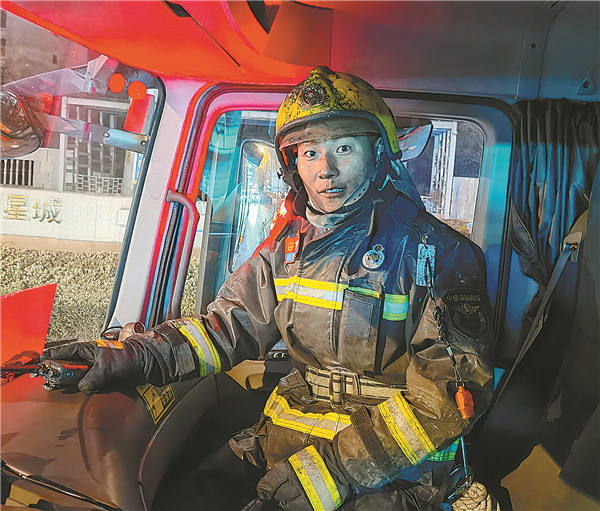
Tibetan fireman Mane Kyab would never forget the scene when he participated in quake relief, after a devastating tremor hit Yushu Tibet autonomous prefecture in Northwest China's Qinghai province 12 years ago.
As Mane Kyab recalls, half of the school buildings collapsed. Frail cries of trapped survivors could be heard calling for help from under the debris, and family members of the deceased were crying, when his team arrived at the front line soon after the disaster.
Although, after massive rebuilding efforts reshaped Yushu, there are no more traces of damage, the post-disaster scene is as clear as yesterday for Mane Kyab.
"The walls were broken, the collapsed precast slabs were swinging, and people were crying-my heart was broken," says the 34-year-old.
Mane Kyab is a Tibetan born in Palung county in Qinghai's Haidong city. The county's name literally refers to "a valley of heroes" in Tibetan language, as the local legends tell that their ancestors were the warriors of ancient Tibet.
He has been working as a fireman at the fire rescue station of the Xichuan South Road of Xining, capital of Qinghai, for 17 years, and he was a rescuer and witness of the Yushu earthquake.
Like the legendary name of his hometown, Mane Kyab has acted bravely while performing his duties in daily life. After his fire squadron received the order to perform rescue for Yushu, he submitted an application immediately to join the mission, and he kept his promise battling the disaster.
In one of his earlier diaries, he wrote, "I am a Tibetan soldier. It's good to send me to the front line, as I can understand Tibetan language, and I am a veteran."
That year, he was only 22, and it was his fifth year working as a fireman.
As he recalls, after arriving in Yushu, he was dispatched to perform rescue work in the city's normal school, and what appeared in his eyes were collapsed houses, and debris.
"All the exits of the collapsed buildings were blocked, the space where we performed the rescue work was very narrow, so we had to keep digging the ruins with both hands," says Mane Kyab.
"My fingers were bleeding, cut by the exposed steel bars. After simple dressing, I continued the rescue work," he says.
After more than 10 hours of continuous digging, they retrieved the bodies of 11 victims. In their 12-day work, his team rescued six survivors.
"As a fire rescuer, I knew that I should never give up, because every minute of our efforts would help to save a life," he says.
Apart from his heroic dedication in Yushu, he also participated in rescue work in other fields.
In July 2010, there was a major flood in Golmud city in Qinghai, and he joined the relief work without hesitation. In November 2015, his team saved the lives of a mother and her two daughters near Xining's Huangshui River. When he found them, they were so desperate that they were ready to jump into the river.
In September 2018, he successfully saved a man, who was about to commit suicide on a cable-stayed bridge at a height of about 40 meters in Xining.
Over the 17 years of his career, Mane Kyab has been awarded many times. He has twice won third-class merits and the title of "excellent soldier", along with 15 other awards.
In 2010, he won the title of "heroic model in quake relief" by the Qinghai government. His family was selected as one of Qinghai's "most beautiful families" in 2019.
In 2020, he won the title of Qinghai's "excellent firefighter". Last year, he won the title of "model of morality of Xining". And only recently, he was awarded the China Youth May 4th Medal, becoming the only one in Qinghai province to win this glory this year.
"The glory of winning the China Youth May 4th Medal is not only for me, but for my team. It is for all of us, firefighters," he says.
"Glories are not important to me; saving lives matters the most for us."













